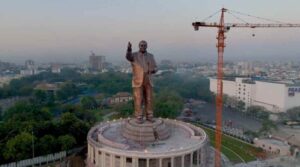Three years ago, Rakesh Gangwal told me firmly that he would not sell a large enough shares in Indigo-worth around RS 30,000 Crore at the current price – the airline was founded with Rahul Bhatia. Disclaimer is needed because of the evil quarrel with Bhatia and speculation rampant that the gangwal is determined to part with the stake and its part with the founder.
Last Friday, Interglobe flights, the parent company that runs Indigo, published a gangwal of the public to the Board revealed his decision to resign as Director to facilitate the sale of shares. What has changed in three years? Significant ownership peeler by unusual promoters. However, gangwal decisions are predictable results from messy scratches dragged in the press and court.
What does this mean for Indigo? Does the dispute between Co-Founders really end? If you are still wondering about the reasons and the consequences of gangwal action, below are primers on all important questions, collected from people with direct knowledge of this problem Gangwal and Bhatia are no longer friends. Professionally, they remain polite but their relationship becomes tense – and beyond repairs – because of differences originating from related party transactions (RPTs). Upset gangwal with offers entered by Indigo with companies such as Lnterglobe Hotel, Real Estate Business Lnterglobe, and Air Transportation Lnterglobe, among others, which included in the IgE Bhatia group To complete the spat, Interglobe approved the demand for gangwal to expand the council up to 10 members, including four independent directors, and a female director. RPTs are also reviewed for gangwal satisfaction.
The difference that remains has not been resolved is the clause contained in the Association (AOA) of Indigo who gangwal and Bhatia the right to deny the sale of shares. The disagreement was played at the International Arbitration Court in London. The court sided with Gangwal, upholding the shareholder meeting held on December 2021 to change AOA and raise restrictions on selling shares.
Gangwal has its way but he has far distanced himself from the airline. In an interview three years ago, he told me that he was no longer involved in Indigo’s operation However, Bhatia said it was greater in all the things Indigo thanks to the shareholder agreement that gave the right to the IgE group to appoint five of the 10 directors in the Board and the Director of Executing, CEO, and President. The agreement has since ended and certain elements are embedded in AOA, including the dominant rights of IgE as well as gangwal rights to name the number one director Apart from his lean rights, Gangwal first said in the airline 17 years, but it changed as the relationship between the two frayed founders.
The only gangwal skin in the game is to remain an investor and he doesn’t want to commit another way to the company he has a little control Bhatia and company companies controlled around 38 percent of interglobe while gangwal and affiliates have around 37 percent. A little above 25 percent is held by public shareholders, including global investors and funds Gangwal now plans to speed up investment in other assets. Very personal individuals, gangwal quietly investing in American and European startups that pursue disturbing technology. He has affinity for interference; He bet on Indigo in the trust of the company can interfere with Indian flights.
Why does the gangwal out board?
As described in letters by gangwal, this is to avoid trafficking allegations. In the heart of this airline business continues booking. Indigo and other airlines allow customers to order months before the actual travel date. The Board of Directors and Puncak Management learned earlier about the income from the weekly report on the order. As a director, Gangwal will find out this information. For this reason, he will not name the director in his place that can be accused of passing critical information.
How much does Gangwal plan to sell?
Gangwal tends to sell up to 90 percent of its shares in Indigo starting later this year and gradually over the next five years. He will hang on small shares because he has the right to get a board seat under the Articles of Association if he remains investing. AOA amendments to deny that this right can be enforced only with approval of 75 percent of the votes provided by shareholders.
Will Gangwal invest in IndiGo competitor Akasa?
Gangwal is now free selling shares when he is happy. But he would be careful to settle on the buyer because he did not want the shares to land in the wrong hand. He also won’t invest in Rakesh Jhunjhunwala funded by Airlines Two reasons. One, he did not want to appear as a venge. Two, he has clarified that he wanted to benefit from a potential price increase in Indigo shares. Investing in competitors is detrimental to that ambition Gangwal is an investor who thinks long-term. Indian flights have now changed fundamentally with Indian water purchases by Tatas. Tatas must sink billions of dollars to support Indian air for at least three years. But to generate profits, Tatas will be forced to raise tariffs of up to 20% Indigo stands to benefit because it can also increase prices to a level that will be cheaper than Air India and risen profit margins. Add this, Litani Problems in tearing at Spicejet Low-cost airlines competing.
Who is the most profitable? Rakesh gangwal.
Is Gangwal’s resignation connected to Rahul Bhatia becoming managing director of IndiGo?
Unusual for a promoter to take a managerial role. Airline promoters usually rely on professionals to run operations. It said the gangwal decision to get out of the council two weeks after the appointment of Bhatia as MD was just a coincidence. Gangwal’s decision was the result of the incident given three years ago when he complained to Sebi about the problem of Indigo corporate governance.





